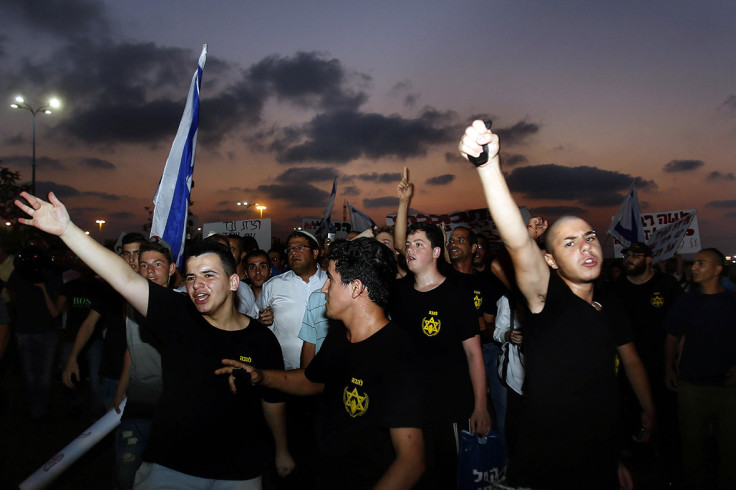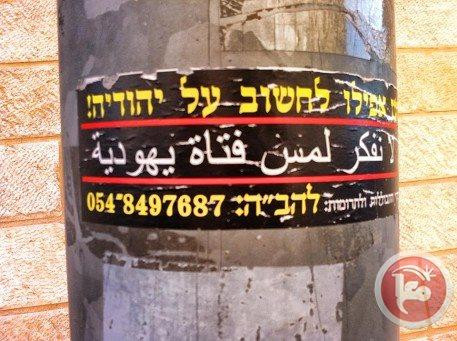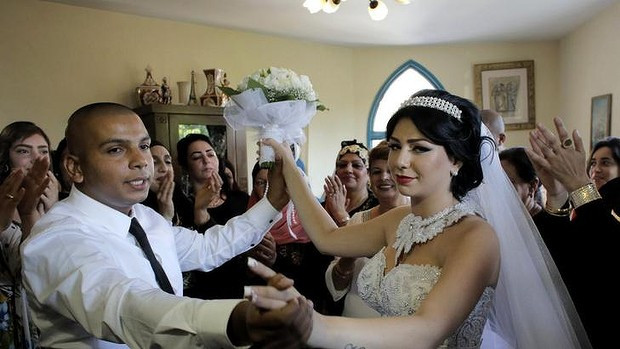Meet Lehava, the Israeli Fascists Mounting a Vicious Crusade to Keep their Women Away from Arabs

"Dear Arab guy, we don't want you to get hurt," read a poster that started doing the rounds on social media in 2012. "If you are thinking of dating Jewish girls, this isn't the place for you... Last week an Arab who thought he might find himself some Jewish girls was hurt. We don't want you to get hurt, so respect our daughters' honour."
The poster was created by Lehava, a group that is committed to opposing marriage between Jewish women and non-Jewish men. With the stated aim of "saving the daughters of Israel," the group runs a hotline encouraging callers to report such relationships.
The organisation styles itself as a sort of moral arbiter, alternating between thinly veiled threats against non-Jews and pleas towards Jewish women who must be "protected." It holds regular demonstrations each weekend in Jerusalem, urging Jews to protect themselves from the "dangers of assimilation."
"Don't defile yourself," reads another Lehava poster. "Beware of goys [a derogatory term for non-Jews] who seek to degrade you."
Lehava - the group's Hebrew initials stand for "Preventing Assimilation in the Holy Land" - is headed by Benzi Gopstein, a former member of the banned Kach party, the extreme right-wing party led by the late Rabbi Meir Kahane.
Speaking to IBTimes UK ahead of the group's "first large-scale" demonstration in Tel Aviv on Thursday, Gopstein described the organisation as "a group of Jews aiming to safeguard against assimilation."
"There are enemies within this country who believe this country belongs to them," Gopstein says, in the first of several mentions of the "enemy within" during the course of our conversation. "It's a recipe for disaster."
So are all the Arabs enemies? Pause. "No, but Jews should be given preference."
Arabs would be allowed to remain in Israel, "if they agree to the conditions, to accept Israel as a Jewish country."
He repeats that men and women should "know not to assimilate," saying that if he met an Arab and Jewish couple on the street today, he "would say that they had no future, that the relationship is forbidden, and not recommended."
What message would Gopstein convey to them? "That according to Judaism it is forbidden."
This type of muted language feels strangely at odds with the many charges of incitement, threats, intimidations and overt racism levelled at the group. "We do not incite or intimidate, we explain," he tells me in a flat, calm voice.

What about the leaflet distributed by Lehava urging Jews not to work with or employ Arabs? Gopstein is silent for a moment. "We want to work with Jews, not enemies."
And the charges of violence? "As a principle we are non-violent...if we are attacked we will retaliate but only in cases of self-defence."
Instances of violence towards leftist activists in Israel are dismissed as "not our people, no."
Does he think his actions encourage people to behave violently? "There are those that try to fight us, but it won't help them, we won't break...we're not violent, we act according to the law."
What about your supporters who call for death to Arabs? "We don't agree with those strategies" Gopstein insists.
Yet despite their founder's protestations, several Lehava members have been connected to what police term "serious incitement," and have been linked to violent assaults on Palestinians.
In July the group's Facebook page was removed, but it still manages to recruit members through social media and word of mouth. Most recently, Lehava made headlines after picketing the wedding celebrations of a mixed Arab-Jewish couple.
Fighting for free speech?
Mahmoud Mansour, an Arab-Israeli, and Morel Malka, a Jewish-born woman who had converted to Islam, had unsuccessfully petitioned to ban last month's demonstration. In what Gopstein hailed a "victory for free speech," a judge ruled it could go ahead providing protesters stayed 200 metres away from the venue.
Police were deployed to prevent clashes and several arrests were made as Lehava demonstrators carrying placards with slogans such as "I wanted a grandson, I got a shahid [martyr]" and "assimilation is a Holocaust" were met by counter-protesters who arrived armed with flowers and balloons and shouted messages of congratulations to guests.

Tensions ratcheted up as some within the crowd started chanting "death to leftists," and "death to Arabs," while one of the organisers tried to calm them down.
'The protesters shouted 'I wanted a grandson, I got a shahid'
The protest was slammed by Israeli President Reuven Rivlin, who called Lehava "rodents gnawing under the shared democratic and Jewish foundation of Israel."
"The incitement against them is outrageous and worrying," read a statement on Rivlin's Facebook page. "Not everyone has to share in the happiness of Mahmoud and Morel — but everyone has to respect them."
But while in Israel Gopstein is viewed with contempt by many - and mocked for high-profile stunts such as his letters urging Facebook founder Mark Zuckerberg not to marry his "goy" girlfriend - a sizeable number of people are in agreement with him.
In a country where many believe that both Arabs and leftists "have no place," and measured discussion of key issues is slammed as "left wing," demonstrations and nationalistically motivated attacks show no sign of abating. This summer's war also recruited many young, impressionable members to the cause.
You need not look any further than the aforementioned wedding, which was even opposed by the bride's father.
"I never dreamed that my daughter would marry an Arab," he told Israel's Channel 10 at the time. "I'm not going, period."
© Copyright IBTimes 2025. All rights reserved.



















